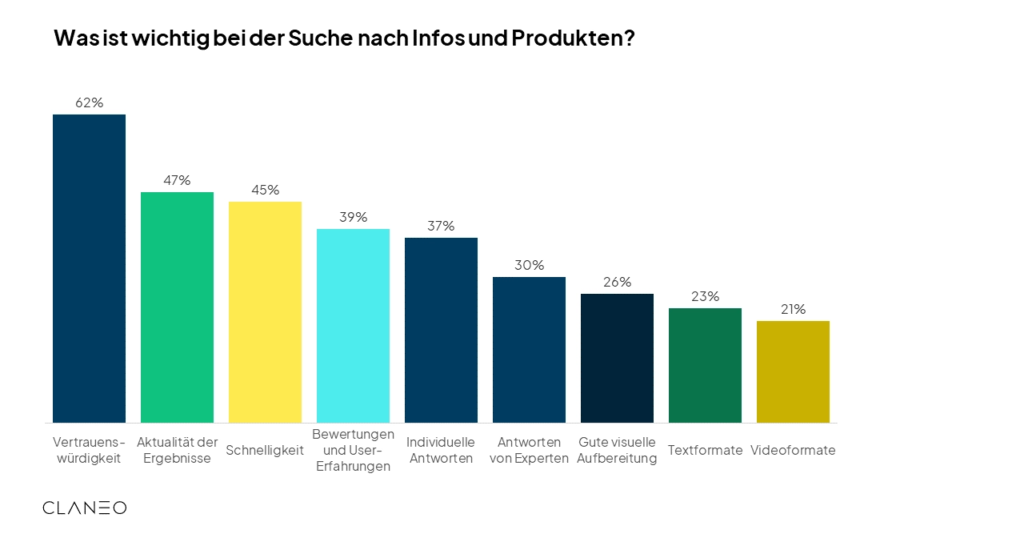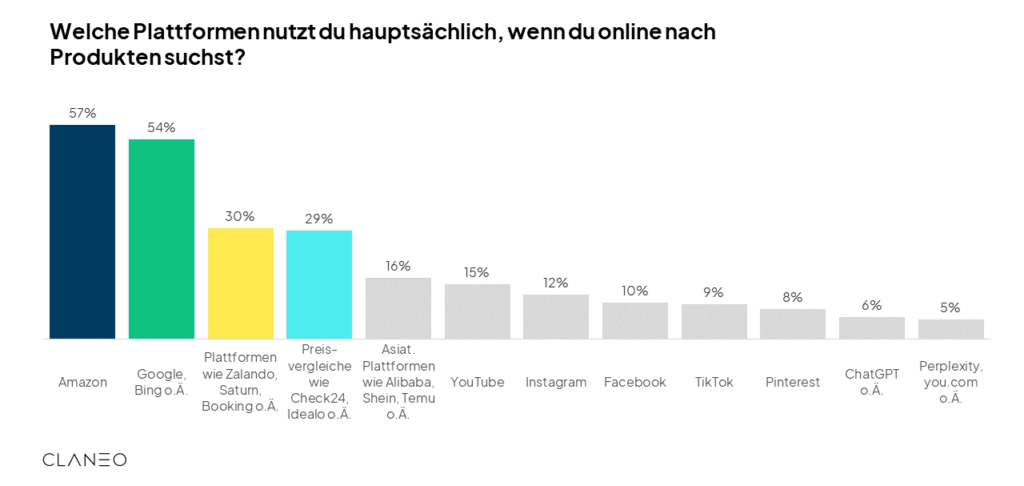In Germany, most searches are still done via Google, but many users now also regularly use ChatGPT, Perplexity, and TikTok. One factor is by far the most important to them. And: Younger users search differently for what is of interest to brands. Find out more about the State of Search and find out where users often search for products.
After years of dominance, Google is no longer the number one place for many people, especially young people, to search the internet. Instead, more and more users are turning to social media to search for products or reviews, for example. Various social media platforms are encouraging this trend by making search more attractive by integrating new features – such as TikTok with a new image search or YouTube in collaboration with Google.
Google Lens for YouTube:
New dimension of search
In addition to social platforms and classic search engines such as Google, AI tools such as ChatGPT are also increasingly being used in searches. A new survey reveals how many users use the various platforms in the search context, which contact points are most trusted and how search behavior differs depending on the platform. Claneo in collaboration with Appinio in April 2024. A total of 1,001 people aged 16 to 65 were surveyed.
Google still at the top
Despite strong competition, Google is still the leading search platform. 81 percent of respondents say they use Google at least every two to three days. YouTube is also used regularly by a large proportion of users (71 percent) for searches. Instagram accounts for 53 percent of daily use in the search context, while AI search engines such as Perplexity are used by 20 percent of users at least once a week. Chatbots such as ChatGPT are used weekly by a third of respondents.
Google competitor Perplexity:
New Discover Feed and first Ad

Overall, traditional search engines such as Google are the most frequently used platforms among all platforms examined and across all age groups. The younger people are, the more frequently AI chatbots and platforms such as TikTok are used for searches. For people over 40, Facebook is the dominant social network in the search context. The following graphic illustrates which aspects are particularly important to users when searching on the Internet.

These platforms score highly in terms of trust
Trustworthiness ranks first among the most important features that a search platform should have, even ahead of the timeliness of the results and speed. In addition to Google, Bing and Co. (88.5 percent), Amazon is also viewed by many respondents (88.2 percent) as somewhat to very trustworthy. Alibaba, Shein, Temu and similar platforms, on the other hand, are rated by more than half as rather untrustworthy or not at all trustworthy – things don’t look much better for TikTok at 51.8 percent.

Where do users look for products?
Which platform is used for searching differs not only by age group, but also by search intent. For example, those looking for help or instructions for a specific task are increasingly turning to traditional search engines (57 percent) or YouTube (51 percent). Amazon scores highly when it comes to product searches: the online marketplace is the number one point of contact for 57 percent of respondents. However, when looking for clothing, many users (48 percent) prefer to use Zalando, AboutYou, and others.

Martin GrahlManaging Director of Claneo, comments on the increasingly diverse search behavior of users on the Internet:
Even though search engines such as Google or similar are, as expected, the leading platforms for information searches, search behavior on the Internet is now very diverse. The choice of search platform depends in particular on the age of the searcher, the topic and the search intent (product search, brand search or information search). For example, when searching for instructions, Gen Z uses TikTok and chatbots such as ChatGPT (almost 25 percent) in addition to Google and YouTube. It was also exciting to see that Google is no longer the first port of call for product searches, but rather Amazon (primarily for cheap products) and one’s own favorite website, depending on the topic (e.g. Booking.com, MediaMarkt or Zalando).
Google Search:
Markup for returns info and merchant listing performance for images
This article first appeared on June 25, 2024
Source: onlinemarketing.de


